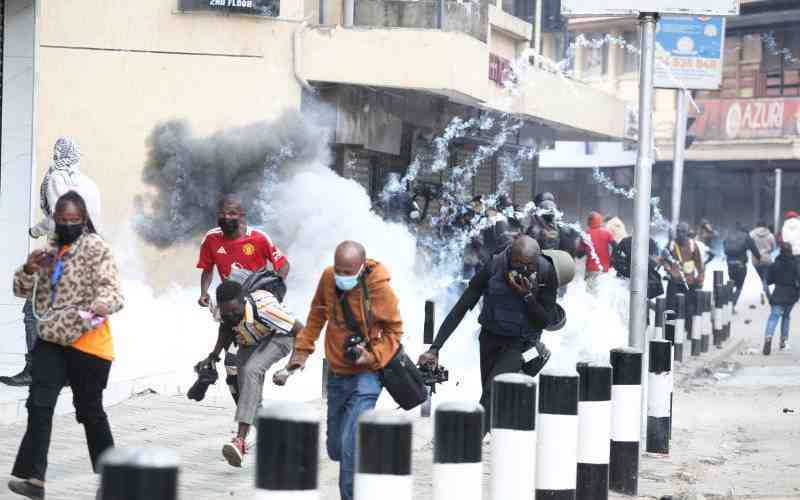Saba Saba: Editors or relics of a bygone era?

[Jonah Onyango, Standard]
CNN correspondent Larry Madowo alleged in a chilling social media video that a plot had been hatched to harm him on Saba Saba Day.
While Mr Madowo stayed away, many reporters on the ground were assaulted. It was another dark day for the media. But most alarming was the behaviour of some editors and media houses.
Nothing can be more damaging than a newsroom that fails to empower the public with clarity and truth during chaotic moments like last Monday. That’s just accomplished mediocrity!
Some outlets brazenly disregarded the newsworthiness of July 7. Flipping through a section of the print media on Tuesday, a day after Saba Saba, what was splashed were shallow exposés. A major TV station beamed soap operas the whole day. Did the editors take a well-calculated nap?
While the country was on the edge, the daring gate-keepers who strived to ‘kill’ the Saba Saba story had their moment. It was a slap in the face of news values like proximity, human interest and timeliness. One would ask: What kind of editor looks away from a big story even if incompetence, patronage and commercial interests are at play?
On the flip side, some news media were engrossed in the adrenaline of live coverage to the extent that they badly blurred the line between bold reporting and reckless melodrama. If media houses exploit emotional responses and disregard the audience wellbeing and the fact that some story angles can add fuel to the fire, they expose themselves. It’s wrong to glorify violence.
Still, what’s more unforgivable is the crime of willfully downplaying or ignoring the gravity of a news situation like Saba Saba. A lot is stake when you keep the public tuned out. Such behaviour belongs to the past. If events of Monday weren’t news, then what were they? No spin or editorial justification can excuse such abdication of duty.
When a media house disregards big breaking stories, it not only betrays its core mandate but also disengages the audience from the news altogether. They make trust in the news to drop to its lowest. A 2024 survey suggests that 25 per cent of the local audience distrusts the media entirely. Trust usually comes through the pinhole but leaves through the door.
Worse still, such behaviour by editors-turned-censors during pivotal news moments inadvertently fuels news avoidance. News avoidance is a phenomenon that occurs when an audience selectively consumes or entirely avoid news they perceive as depressing, negative or misaligned with their beliefs. This trend must concern us given our entrenched political divisions.
While I may not have exact statistics on Kenya’s news avoidance landscape, the trend is widespread. It’s driven not only by perceptions of negativity and bias but also by the growing influence of alternative media, particularly social media and informal digital platforms.
Then there’s the question of patriotism. It isn’t synonymous with cheerleading. We aren’t patriotic because we merely defend authorities or shun uncomfortable truths. Patriotism is not about silence during national crises. Running away from tough stories to portray a false image of unity or to retain goodwill and advertising contracts is pure cowardice.
For the record, patriotism is real only when the media sector commits to telling the truth for the good of the country, not against national interests and wellbeing. But there’s a rider: The truth doesn’t mean slanting stories to mudsling authorities. It means simply reporting the naked truth.
To publish or not? To broadcast or not? We can draw courage in the words of Indian journalist Ipsita Chakravarti, a media colleague I met at Oxford, that in the wake of challenges facing the news media today, we are not alone. The public will always be there as the media’s foremost defender; thus public interest must remain sacrosanct.
Patriotism in journalism is responsible, principled and quietly defiant when it matters most for a country. With President William Ruto being a respecter of media freedoms, it behoves top editors to follow the ethics code, nothing else. The Media Council of Kenya will agree.
Stay informed. Subscribe to our newsletter
You may also like...
Diddy's Legal Troubles & Racketeering Trial

Music mogul Sean 'Diddy' Combs was acquitted of sex trafficking and racketeering charges but convicted on transportation...
Thomas Partey Faces Rape & Sexual Assault Charges

Former Arsenal midfielder Thomas Partey has been formally charged with multiple counts of rape and sexual assault by UK ...
Nigeria Universities Changes Admission Policies

JAMB has clarified its admission policies, rectifying a student's status, reiterating the necessity of its Central Admis...
Ghana's Economic Reforms & Gold Sector Initiatives

Ghana is undertaking a comprehensive economic overhaul with President John Dramani Mahama's 24-Hour Economy and Accelera...
WAFCON 2024 African Women's Football Tournament

The 2024 Women's Africa Cup of Nations opened with thrilling matches, seeing Nigeria's Super Falcons secure a dominant 3...
Emergence & Dynamics of Nigeria's ADC Coalition

A new opposition coalition, led by the African Democratic Congress (ADC), is emerging to challenge President Bola Ahmed ...
Demise of Olubadan of Ibadanland
Oba Owolabi Olakulehin, the 43rd Olubadan of Ibadanland, has died at 90, concluding a life of distinguished service in t...
Death of Nigerian Goalkeeping Legend Peter Rufai

Nigerian football mourns the death of legendary Super Eagles goalkeeper Peter Rufai, who passed away at 61. Known as 'Do...



